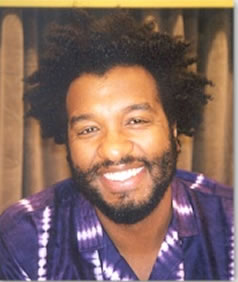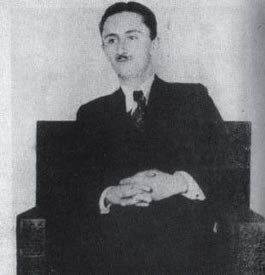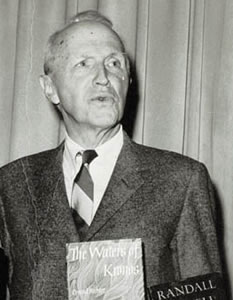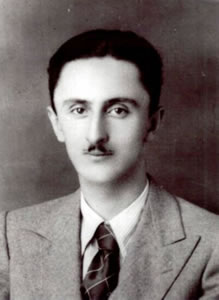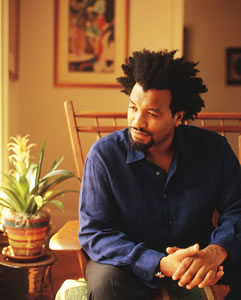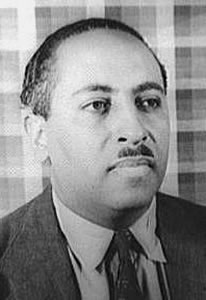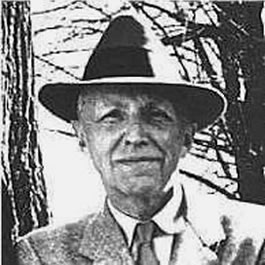De Nederlandse schrijver Herman Franke werd geboren op 13 oktober 1948 in Groningen. Zie ook mijn blog van 13 oktober 2006 en ook mijn blog van 13 oktober 2007 en ook mijn blog van 13 oktober 2008 en ook mijn blog van 13 oktober 2009. Herman Frank overleed op 14 augustus van dit jaar. Zie ook mijn blog van 16 augustus 2010.
Uit: De verbeelding
„Het oog van de liefde
Het daglicht in zijn atelier is genadeloos, maar hij ziet niets dat afbreuk doet aan haar rijpe, venusachtige schoonheid. Zelfs de opvallend grote moedervlek op haar buik siert haar. Ze ligt als een kostbaar juweel op het zwartfluwelen, met zilverdraad bestikte divankleed. Voor het eerst in zijn lange kunstenaarsleven voelt hij, kijkend naar een model, de miezerige opwinding van een voyeur. Haar hoofd steunt op de gebogen hand van haar linkerarm. Van haar gezicht straalt de gracieuze blijheid van Euphrosyne. Ze is zo onmenselijk mooi dat hij haar onwillekeurig behandelt als een stilleven van vrouwelijke schoonheden dat je vrijelijk kunt hergroeperen. Hij schuifelt met samengeknepen ogen naar haar toe en vouwt haar rechterarm als een krans rond haar hoofd waarbij de rug van zijn hand langs een van haar borsten strijkt. Nog voordat hij zich kan excuseren, schenkt ze hem de vrijgevochten lach van een bacchante die hij op tientallen schetsen en schilderijen van haar heeft vastgelegd toen ze nog Emma Hart heette. Terwijl hij verlegen teruglacht, verschijnen als bij toverslag de trekken van een meisjesachtige onschuld op haar gezicht.
‘Je bent een godin,’ zegt hij en reikt naar haar benen.
`Mag ik?’
Ze knikt traag zonder haar ogen van hem af te houden. Aarzelend legt hij haar linkerbeen over haar rechter en tilt haar heup iets op zodat de volle ronding van haar bil zichtbaar wordt. Hij doet enkele stappen achteruit en neemt haar keurend op.
`De mooiste godin,’ zegt hij.
Ze werpt spottend een vrome blik naar de hemel voordat ze hem onweerstaanbaar verleidelijk aankijkt. Meer dan ooit voelt hij zich een oude man. De voorbije jaren drukken verwijtend op zijn schouders. Zijn zucht naar roem dreef hem in 1762 van het provinciale Kendal in Westmorland naar het wereldse Londen. Zijn vrouw Mary en zijn zoontje John zouden hem later volgen maar daar kwam het nooit van. Eerst had hij geen geld en later was hij aan de vrijheid gewend. Getrouwde kunstenaars waren geen echte kunstenaars. Ze moesten groots en meeslepend willen leven. Maar als het er bij hem op aankwam won zijn moraal het altijd van zijn hartstocht. Nu is het te laat. Een zuur gevoel van spijt speelt op in zijn maag.”

Herman Franke (13 oktober 1946 – 14 augustus 2010)
Getekend door Peter van Dongen
De Jamaicaanse schrijver Colin Channer werd geboren op 13 oktober 1963 in Kingston. Zie ook mijn blog van 13 oktober 2008 en ook mijn blog van 13 oktober 2009.
Uit: The Girl with the Golden Shoes
„They were sitting on old buckets, scaling fish beneath an almond tree, when someone pointed to the water and they all began to shout.
They were hardy children who’d been raised in isolation on a crescent beach below a cliff, and had experienced many horrors-drownings, stabbings, births, and storms. But when they saw a one-eyed monster rising from the deep, they dropped their tools and dashed off in a blur of skirts and faded tunics to the clump of shacks in which they lived, raising clouds of sand as white as salt.
The eldest girl, Estrella Thompson, would be fifteen soon, and thought herself mature. She’d recently begun to read, which had created an awareness of a universe beyond San Carlos. So, unlike her friends, she was interested in the war.
The war was taking place in Europe, a place she’d only heard about the year before. Poland. Antwerp. Riga. Spain. The names were sparkling gems of sound that shimmered with a range of possibilities that went beyond the dreams of all her neighbors in the cove. So on the rare occasions that she’d had the chance to travel into town, she’d steal away to loiter in the little shops in Woodley, the district of the artisans adjacent to the port. There, she’d listen to the intonations of the BBC announcer on the redifusion box and be transported like a person who’d gone to see a medium for a glimpse of life across the void into the other world.
On these nights more than others, as she curled up in the hammock she shared with other girls beneath a shed beside her old grandmother’s hut, Estrella would gaze outside the window as she fingered old newspapers and her cache of stolen books, dreaming of the day when she’d be rescued from this place where nothing happened.“

Colin Channer (Kingston, 13 oktober 1963)
De Britse romanschrijfster en gewezen politica Edwina Currie werd geboren in Liverpool op 13 oktober 1946. Currie is afkomstig uit een gelovig joods gezin in Liverpool, maar beschouwt zichzelf als enkel cultureel Joods; ze houdt zich naar eigen zeggen niet met „religieuze onzin“ bezig. Aan de Universiteit van Oxford studeerde ze politiek, filosofie en economie, en vervolgens specialiseerde ze zich in de economische geschiedenis aan de London School of Economics. Ze werd in 1975 gemeenteraadslid in Birmingham, waar ze het district Northfield vertegenwoordigde. Deze functie bekleedde ze tot 1986, toen ze Minister van Gezondheid werd. Currie schreef zes romans, die vaak over politieke intriges gaan. In haar dagboeken van de jaren 1987 tot 1992, gepubliceerd in 2002, kwam aan het licht dat ze tussen 1984 en 1988 een affaire met John Major had gehad. Toen Major tot Chief Secretary of the Treasury bevorderd werd, werd de liefdesrelatie te gevaarlijk, al bleef ze, zoals ze zelf zei, nog jarenlang verliefd op hem. Enkele weken na de publicatie van haar dagboeken omschreef ze Major als „een der minder bekwame premiers“, die ze tevens van seksisme en racisme betichtte. Voordien had ze de affaire echter jarenlang ontkend.
Uit: Diaries
20 March 1987:
“The real reason I wanted to write tonight was to record the end of something very special.
“I wrote to B on Thursday night saying that’s it, no more; posted it Friday morning, so he won’t have seen it yet, maybe not till Tuesday.
“Because it isn’t quite the fun it was – he has changed.
“It was best when he was restless, hiding himself, lacked confidence; he told me about his family; his early background, about being out of work, nearly being killed in an accident, all the deep things you only tell your soul …
“He wrote only once, back in 1984 before we started, apologising for something he’d said thoughtlessly, ‘I wouldn’t hurt you for the world’. Once, unguarded, he answered when prodded, ‘I think you’re lovely,’ but that was it …
“So why did it start? Because I was unhappy with a husband forever slumped snoring in front of the television, not helpful or interested in what I was trying to do.
“I needed a friend. The first one turned out to be a right slob, with some kinky preferences and a selfishness of such magnitude as I’ve never met before.
“I needed help and advice to get up from the backbenches, but the slob made it harder. ‘I love you,’ he said, but his real idea of women was to keep them in their place and not upstage him.
“Then B came along, and he was so nice and so attractive, and so quiet in public that it was a challenge to unearth the real person, and to seduce him – easy!
“And it was unexpectedly, spectacularly good, for such a long time.”

Edwina Currie (Liverpool, 13 oktober 1946)
De Albanese dichter Migjeni (eigen. Millosh Gjergj Nikolla) werd geboren op 13 oktober 1911 in Shkodra. Zie ook mijn blog van 13 oktober 2008 en ook mijn blog van 13 oktober 2009.
Blasphemy
The mosques and churches float through our memories,
Prayers devoid of sense or taste echo from their walls.
Never has the heart of god been touched by them,
And yet it beats on amidst the sounds of drums and bells.
Majestic mosques and churches throughout our wretched land,
Spires and minarets towering over lowly homes,
The voice of the hodja and priest in one degenerate chant,
Oh, ideal vision, a thousand years old!
The mosques and churches float through memories of the pious,
The chiming of the bell mingles with the muezzin’s call,
Sanctity shines from cowls and from the beards of hodjas.
Oh, so many fair angels at the gates of hell!
On ancient citadels perch carrion ravens,
Their dejected wings drooping – the symbols of lost hopes,
In despair do they croak of an age gone by
When the ancient citadels once gleamed with hallowed joy.
Song of noble grief
Oh, noble grief of the suffering soul
That into free verse bursts out…
Would you perchance take comfort
In adorning the world with jewels?
Oh, noble grief in free verse,
Which sincerely sounds and resounds,
Will you ever move the feelings of men,
Or wither and die like the autumn leaves?
Oh, song worthy of noble grief…
Never rest! But with your twin,
Lamentation, sing out your suffering,
For time will be your consolation.
Vertaald door Robert Elsie

Migjeni (13 oktober 1911 – 26 augustus 1938)
De Amerikaanse dichter en schrijver Arna Wendell Bontemps werd geboren op 13 oktober 1902 in Alexandria in Louisiana. Zie ook mijn blog van 13 oktober 2008 en ook mijn blog van 13 oktober 2009.
A Black Man Talks of Reaping
I have sown beside all waters in my day.
I planted deep, within my heart the fear
that wind or fowl would take the grain away.
I planted safe against this stark, lean year.
I scattered seed enough to plant the land
in rows from Canada to Mexico
but for my reaping only what the hand
can hold at once is all that I can show.
Yet what I sowed and what the orchard yields
my brother’s sons are gathering stalk and root;
small wonder then my children glean in fields
they have not sown, and feed on bitter fruit.
The Day-Breakers
We are not come to wage a strife
With swords upon this hill,
It is not wise to waste the life
Against a stubborn will.
Yet would we die as some have done.
Beating a way for the rising sun.

Arna Wendell Bontemps (13 oktober 1902 – 4 juni 1973)
De Amerikaanse schrijver Conrad Richter werd geboren op 13 oktober 1890 in Pine Grove, Pennsylvania. Zie ook mijn blog van 13 oktober 2008 en ook mijn blog van 13 oktober 2009.
Uit: The Light in the Forest
„All morning on the path with his father, crazy thoughts ran like squirrels in the boy’s head. Never before had he know his father to be in the wrong. Could it be that he was in the right now? Had he unknowingly left a little white blood in the boy’s veins and was it for this that he must be returned? Then they came in sight of the ugly log redoubts and pale tents of the white army, and the boy felt sure there was in his body not a drop of blood that knew these things. At the sight and smells of the white man, strong aversion and loathing came over him. He tried with all his young strength to get away. His father had to hold him hard. In the end he dragged him twisting and yelling over the ground to the council house of the whites and threw him on the leaves that had been spread around.
“I gave talking paper that I bring him,” he told the white guards. “Now he belong to you.”
It was all over then, the boy knew. He was as good as dead and lay among the other captives with his face down. He was sure that his father had stayed. He could feel his presence and smell the sweet inner bark of the red willow mixed with the dried sumach leaves of his pipe. When dusk fell, a white guard came up. The other soldiers called him Del, perhaps because he could talk Delaware, the strange name the whites gave the Lenni Lenape and their languages. True Son heard Del tell his father that all Indians must be out of the camp by nightfall. From the sounds the boy guessed his father was knocking out his pipe and putting it away. Then he knew he had risen and was standing over him.“

Conrad Richter (13 oktober 1890 – 30 oktober 1968)











